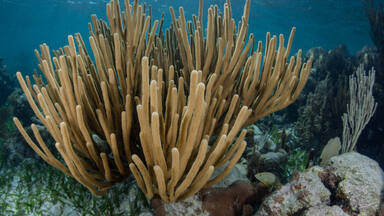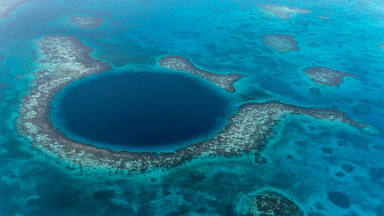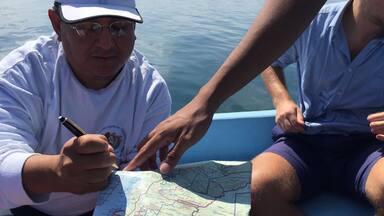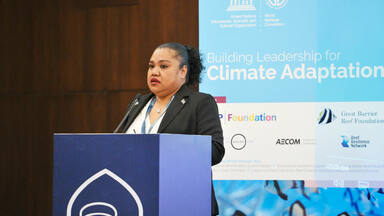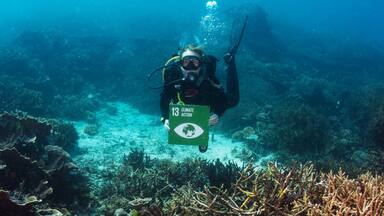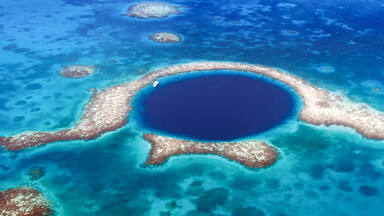Building climate change resilience and adaptation of the Belize Barrier Reef Reserve System (Belize)
The Belize Barrier Reef Reserve System is facing multiple impacts of climate change such as coral bleaching, more severe storms, and rising sea levels. The Resilient Reefs Initiative is focused on building Belize’s resilience through harnessing community knowledge, diversifying livelihoods and seeking opportunities to balance conservation with commercial and local use of the reef.
About the Belize Barrier Reef Reserve System
Extending from the border with Mexico to the north, to near the Guatemalan border to the south the Belize Barrier Reef spans seven serial sites and is the largest reef complex in the Atlantic-Caribbean region. It represents the second largest reef system in the world. The seven protected areas that constitute the Belize Barrier Reef Reserve System (BBRRS) comprises 12% of the entire Reef Complex. Offshore atolls, several hundred sand cayes, mangrove forests, coastal lagoons and estuaries provide habitats to a rich diversity of marine life including threatened species like marine turtles, manatees, and the saltwater American crocodile as well as endemic and migratory birds which reproduce in the littoral forests of cayes, atolls and coastal areas. The Belize Barrier Reef Reserve System was inscribed on the UNESCO World Heritage List in 1996 under criteria (vii), (ix) and (x).
"The system’s seven sites illustrate the evolutionary history of reef development and are a significant habitat for threatened species, including marine turtles, manatees and the American marine crocodile."
Climate change-related impacts
The Belize Barrier Reef Reserve System is facing a number of climate change impacts including sea-level rise, increased sea temperature and acidification, and increased storm frequency and intensity. One of the most serious effects of observed and projected climate change is the physiological consequences of coral bleaching, which has already caused long-term damage to many coral reefs worldwide. According to the IPCC, the increase of sea surface temperature and dissolved CO2 levels in the oceans will represent the most serious threats to coral reefs in the twenty-first century (source).
Management challenges and threats that impact on the integrity of the property include: overharvesting of marine resources, coastal development, tourism, industrial development and proposed oil and gas exploration and exploitation. These threats, common to marine protected areas in general, are less intense due to relatively low population pressure. However, careful management is required to ensure growing population pressures do not lead to significant impacts on the integrity of the property (source).
The sale and lease of public lands for the purposes of development within the property leading to the destruction of mangrove and marine ecosystems have been threats for which the property was inscribed on the List of World Heritage in Danger in 2009. In order to achieve the Desired State of Conservation for the removal of the property from the List of World Heritage in Danger (DSOCR), in 2018, Belize achieved a number of targets including the adoption of a permanent oil moratorium to protect the future of its reefs and the 200,000 citizens that depend on this ecosystem for their livelihoods. Consequently, the World Heritage Committee removed the property from the List of World Heritage in Danger at its 42nd session in 2018, requesting Belize to ensure that pending issues related to the finalisation of the official land tenure verification within the property (Decision 43 COM 7B.21). As of December 2022, the State Party reports that the verification has been completed and will be reported to the next World Heritage Committee (source: Vivian Ramnarace, Belize Fisheries Department, 2022).
The Resilient Reefs Initiative (RRI) is working with key government and NGO partners on the ground to fill gaps, increase coordination, and build capacity where needed to ensure this exceptional place has the resources it needs to deliver on its ambitious goals.
Initiated by the Great Barrier Reef Foundation, the Resilient Reefs initiative is a six-year AUD$14 million (approximately USD$10.5 million at the time of writing) collaboration between The Nature Conservancy's Reef Resilience Network, the Center for Resilient Cities and Landscapes at Columbia University, the Resilient Cities Catalyst, UNESCO and AECOM. The program is supported by the BHP Foundation.
Belize is a global leader in marine conservation, with the recent execution of its US$364m Blue Bond (the largest bond for ocean conservation seen to date). RRI's official partnership with the Belize Coastal Zone Management Authority and Institute (CZMAI) in collaboration with the Belize Fisheries Department was launched in 2021, with the funding and hiring of the site’s first Chief Resilience Officer (CRO) within the local management team to lead the development of the Resilience Strategy for the site. The consultation process included consultations with more than 150 stakeholders as well as comprehensive review of existing research and planning documents (62 plans reviewed).
"This Resilient Reefs Initiative has the potential to significantly impact the site management of the property as it will develop a resilience strategy not only for the WHS but for the entire reef complex. It cannot be looked at site level but as the entire system to ensure the best effective management of the second largest barrier reef in the world through addressing the great threat of climate change. Having the legal mandate for the management of aquatic flora and fauna including the barrier reef complex as well as the National Focal Point for the Belize Barrier Reef Reserve System, it was imperative that the Fisheries Department played a role in the development and implementation of the Resilient Reefs Initiative."
The resulting Resilience Assessment has focused on building Belize’s resilience agenda through addressing climate vulnerabilities of coastal and marine sectors; improving watershed management and safeguarding coral health; harnessing community knowledge; diversifying livelihoods and seeking opportunities to healthy balance conservation with commercial and local use of the reef.
In January 2022, a Resilience Accelerator workshop was held, focussed on finding creative solutions to the challenges of rapid coastal development in Belize. The workshop brought together key stakeholders, community organisers, national agencies, marine park managers, and NGOs to uncover challenges and opportunities in coastal development as well as impacts on the reef, water quality, infrastructure and local livelihoods. Over the course of several months, a multidisciplinary team prepared design and policy proposals that will help inform the update of Belize Integrated Coastal Zone Management Plan, the Strategic Plan for the Ministry of the Blue Economy and the Belize Resilience Strategy.
In early 2023, the stakeholders of the Belize Barrier Reef Reserve System will release their Resilience Strategy, and RRI will work closely with local partners to co-design and implement a set of Flagship actions stemming from this strategy. These will likely include efforts to better protect the country’s remarkable stores of blue carbon, to better coordinate terrestrial watershed management to improve water quality, to expand coral restoration efforts, and to create an enabling environment for livelihood diversification. By bringing together local communities, reef managers and resilience experts across five World Heritage reef sites, this bold new approach puts people at the centre of decision making, drawing on a global resilience practice to innovate, build capacity and drive a whole-of-community approach to the challenges facing treasured reefs.
"The greatest takeaway is the continuous targeted discussions and engagement with key organizations and stakeholders to develop projects and improve the overall governance needed to ensure the success of this initiative. The process must be inclusive to ensure the sustainable use of our marine resources and the safeguarding of livelihoods and wellbeing of our population."
Sources:
- Vivian Ramnarace, Belize Fisheries Department, 2022;
- UNESCO, 2022, Shaping the future of climate adaptation through Resilient Reefs;
- Resilient Reefs Partners, 2021, RESILIENT REEFS Project overview;
- Resilient Reefs Initiative Insights Report 2022
- Lovecchio, J., Grant-Hudd, A., Pawlowski, T, 11 March 2022, Resilient Coastal Development in Belize: Urban Design Studio and Accelerator
Contribution towards global goals
How does this case study contribute to the global commitments of sustainable development, climate change action and heritage conservation?
Sustainable development
The initiative aims to contribute towards sustainable development by addressing the following Sustainable Development Goals:

Target 13.1: the initiatives aim to strengthen resilience and adaptive capacity to climate-related hazards and natural disasters by integrating climate change mitigation and adaptation measures into national strategies, policies and planning.

Target 14.1: The initiatives aim to prevent and significantly reduce marine pollution of all kinds, in particular from land-based activities, including marine debris and nutrient pollution by adaptive watershed management with a focus on upgrading wastewater treatment and safeguarding coral health.
Target 14.2: The initiatives aim to sustainably manage and protect marine and coastal ecosystems to avoid significant adverse impacts, including by strengthening their resilience, and taking action for their restoration in order to achieve healthy and productive oceans.
Target 14.3: the initiatives aim to minimise and address the impacts of ocean acidification, through enhanced scientific cooperation at all levels.
Climate change
The increase of sea surface temperature and dissolved CO2 levels in the oceans, storm frequency and intensity, precipitation patterns, oceanic circulation, ocean acidity and coral bleaching.
While the world reduces global emissions, the most tangible management strategy at the local level is to prepare climate adaptation strategies and increase the overall resilience of ecosystems and communities.
Working with local stakeholders and global partners to shape the resilience agenda for the site.
Developing the Resilience Strategy that details short and long-term solutions to address the vulnerabilities of the coral reef ecosystem and the community that depends on it.
Connection to a global Knowledge Network including other World Heritage-listed coral reef sites and global experts.
Learn more
Discover more about the details of the case study and the stakeholders involved.
To learn more
- Visit the BBRRS's page on the World Heritage State of Conservation Information System (SOC) and the Resilient Reefs webpage.
- Visit the interactive story "Resilient Belize: Envisioning Climate Justice for Mesoamerican Reef Communities" by Columbia University, M.S Architecture and Urban Design Studio.
- Read the 2022 Resilient Reefs Initiative Insights Report and Columbia's Resilient Reefs Urban Design Studio and Accelerator Workshop Report.
Contact
UNESCO World Heritage Marine Programme.
- Website: whc.unesco.org/en/marine-programme
- Contact: Dr Fanny Douvere, Senior Project Officer, Natural Heritage Unit.
Credits
© UNESCO, 2022. Project team: Jyoti Hosagrahar, Alba Zamarbide, Carlota Marijuán Rodríguez, Mirna Ashraf Ali, Altynay Dyussekova.
Cover image © Brandon Rosenblum
Note: The cases shared in this platform address heritage protection practices in World Heritage sites and beyond. Items being showcased in this website do not entail any type of recognition or inclusion in the World Heritage list or any of its thematic programmes. The practices shared are not assessed in any way by the World Heritage Centre or presented here as model practices nor do they represent complete solutions to heritage management problems. The views expressed by experts and site managers are their own and do not necessarily reflect the views of the World Heritage Centre. The practices and views shared here are included as a way to provide insights and expand the dialogue on heritage conservation with a view to further urban heritage management practice in general.
Decisions / Resolutions (1)
The World Heritage Committee,
- Having examined Document WHC/19/43.COM/7B,
- Recalling Decision 42 COM 7A.43, adopted at its 42nd session (Manama, 2018),
- Welcomes the State Party’s confirmation that it will complete the land tenure verification process in April 2019, followed by the designation of remaining public lands within the property as strict mangrove reserves, however notes that this was not completed in 2018 as requested in Decision 42 COM 7A.43, and requests the State Party to finalize the process as a matter of priority and no later than 31 December 2019;
- Also welcomes the confirmation provided by the State Party that consideration of the property’s Outstanding Universal Value (OUV) has been included in the Environmental Impact Assessment (EIA) Checklist and the amended EIA Regulations are expected to be approved in 2019, and also requests the State Party to confirm the official approval of the amended Regulations, once available;
- Takes note of the information provided by the State Party regarding the continued implementation of the Integrated Coastal Zone Management Plan, including through bilateral and multilateral programmes and funding initiatives, and encourages the State Party to continue these efforts;
- Further welcomes measures undertaken by the State Party to further strengthen fishing regulations, including progress achieved towards finalization and official approval of the Fisheries Resources Bill and actions aimed at increasing the total area covered by no-take zones;
- Further requests the State Party to submit to the World Heritage Centre, by 1 December 2020, an updated report on the state of conservation of the property and the implementation of the above, for examination by the World Heritage Committee at its 45th session in 2021.
